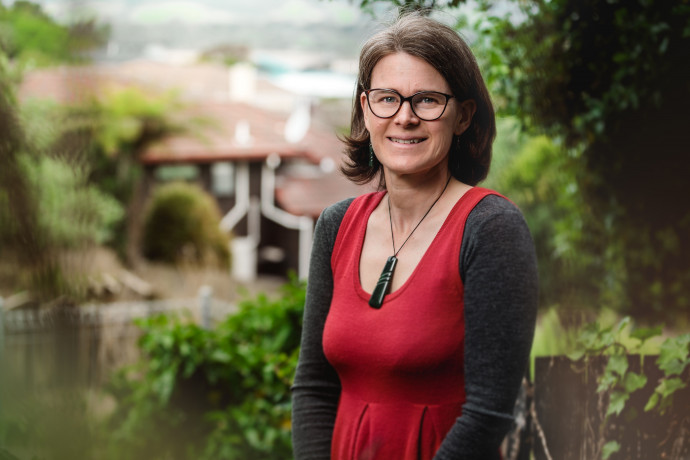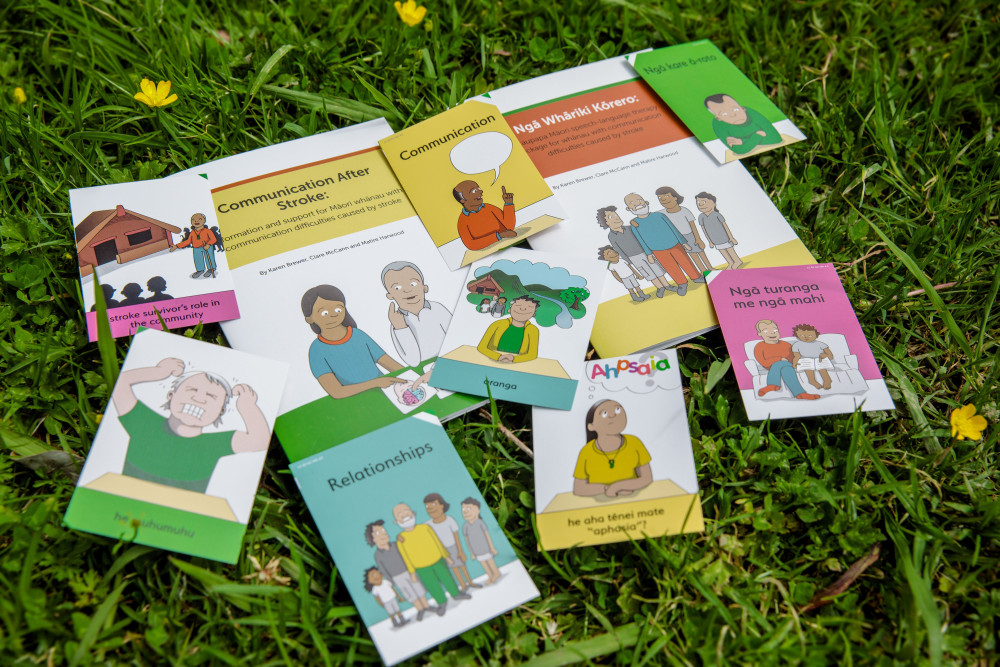2021 Te Kōpūnui Māori Research Award: A kaupapa Māori intervention shifting the boundaries of speech-language therapy

Dr Karen Brewer (Whakatōhea, Ngaiterangi) has received the Royal Society Te Apārangi Te Kōpūnui Māori Research Award for her work on Ngā Whāriki Kōrero, a kaupapa Māori speech-language therapy resource for whānau with communication difficulties following stroke, and the speech-language therapists who work with them.
Whānau Māori and speech-language therapists (SLTs) have identified a need for kaupapa Māori and bilingual therapy resources. In response to this need, Dr Karen Brewer undertook a postdoctoral research fellowship to create a kaupapa Māori therapy package for whānau with communication disorders caused by stroke. This package was developed in connection with Māori whānau, SLTs, and Māori Health experts. The therapy package includes an online professional development module for speech-language therapists working with Māori, a website for patient and whānau information and self-directed rehabilitation, and a bilingual ‘Talking Mats’ resource for use in speech-language therapy with stroke-survivors and their whānau members.
Brewer completed this mahi as the recipient of a Health Research Council of New Zealand Eru Pōmare Postdoctoral Research Fellowship in Māori Health. As the principal investigator for the project, she was responsible for all aspects of research design, carrying out the research, and documenting the findings. The therapy package has been reviewed and endorsed by Rukingi Haupapa, a stroke survivor and kaumatua for the New Zealand Speech-language Therapists’ Association.

'Talking Mats' resource
An important element of this speech-language therapy resource is the online professional development for speech-language therapists. The course covers health inequities faced by Māori, social determinants of health, racism, Te Tiriti o Waitangi, cultural safety, and power inherent in the therapist’s role. It then provides specific information about therapy for Māori stroke patients with communication disorders and working with Māori health colleagues. This course shifts the boundaries of speech-language therapy beyond traditional “cultural competence” to a public health approach which focuses on the culture of speech-language therapy as a discipline and the context of Māori as Indigenous peoples in a colonised society.
This work has a direct impact in the disciplinary field of speech-language therapy, where it is already being used. As far as the researchers are aware, it is the only Māori speech-language therapy resource and the only te reo Māori bilingual speech-language therapy resource for stroke survivors. Because of the widespread lack of Māori speech-language therapy resources, requests for copies of Ngā Whāriki Kōrero resources have also come from therapists working in other areas of speech-language therapy such as traumatic brain injury and childhood hearing impairment.
This project is an important innovation for the discipline of speech-language therapy as it works to target issues beyond the individual and whānau and it is likely to have a big impact in reducing inequities in Māori health.
On receiving the Te Kōpūnui Māori Research Award, Karen said: “I am honoured to accept this award. I hope it will help raise awareness of aphasia and other communication difficulties that impact whānau Māori. Having created Ngā Whāriki Kōrero, I am pleased that there is now something that speech-language therapists can offer whānau Māori. I also recognise that it is only a small step on a long journey towards culturally safe and equitable speech-language therapy services.
Many, many people contributed to the creation of Ngā Whāriki Kōrero, as listed in the acknowledgements section of the resource booklet. Now I will name only three. Dr Matire Harwood and Dr Clare McCann were my postdoctoral supervisors and co-authors of Ngā Whāriki Kōrero. They have both contributed greatly to the kaupapa. Finally, I dedicate this award to the memory of Te Whaawhai Taki. With her enthusiasm, dedication, community connections and knowledge of tikanga and te reo Māori, Whaawhai was so much more than a kaiawhina rangahau on this project. She was a mentor who kept me grounded and opened doors that I didn’t know existed. Whaawhai’s untimely passing was a huge loss for her whānau and community, for whom she was a pillar of strength, a tireless worker, and a fierce advocate.”
Award:
Awarded annually to recognise innovative Māori early career researchers with a promising trajectory.
Citation:
To Karen Marie Brewer for a kaupapa Māori speech-language therapy resource for whānau with communication difficulties following stroke.
